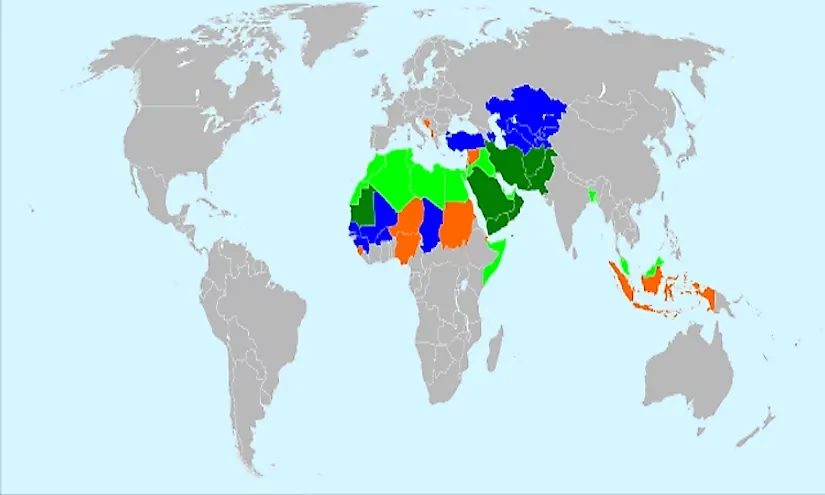Introduction
Welcome to a fascinating exploration of the top 10 Muslim countries around the world. As our global landscape evolves, understanding the dynamics and demographics of Muslim-majority nations becomes increasingly vital. These countries not only represent significant portions of the world’s population but also boast rich histories, diverse cultures, and profound contributions to various fields. In this article, we delve deep into the characteristics, demographics, and unique features of these top 10 Muslim nations, shedding light on their societal fabric, economic prowess, and geopolitical significance.
Exploring the Top 10 Muslim Countries
Let’s start by taking a glance at the data portraying the top 10 Muslim countries:
| Rank | Country | Population (2024) | Capital |
| 1 | Indonesia | 276 million | Jakarta |
| 2 | Pakistan | 225 million | Islamabad |
| 3 | India | 1.4 billion | New Delhi |
| 4 | Bangladesh | 168 million | Dhaka |
| 5 | Nigeria | 221 million | Abuja |
| 6 | Egypt | 104 million | Cairo 7 |
| 7 | Turkey | 84 million | Ankara |
| 8 | Iran | 85 million | Tehran |
| 9 | Algeria | 45 million | Algiers |
| 10 | Morocco | 37 million | Rabat |
Indonesia: A Cultural Tapestry
1.1. Rich Diversity: Indonesia, with its vast archipelago, is a melting pot of cultures, languages, and traditions.
1.2. Economic Powerhouse: Despite its diversity, Indonesia stands as a formidable economic force in Southeast Asia.
Pakistan: The Land of Contrasts
2.1. Historical Heritage: Pakistan boasts a rich history dating back to ancient civilizations like the Indus Valley Civilization.
2.2. Geopolitical Significance: Situated at the crossroads of South Asia, Central Asia, and the Middle East, Pakistan plays a crucial role in regional politics.
India: Harmony in Diversity
3.1. Pluralistic Society: India prides itself on being a secular nation that accommodates various religions and cultures.
3.2. Technological Advancements: With its booming IT industry, India has emerged as a global leader in technology and innovation.
Bangladesh: A Rising Star
4.1. Economic Growth: Despite its challenges, Bangladesh has shown remarkable economic progress in recent years.
4.2. Resilient Spirit: Bangladeshi people exhibit resilience and determination, overcoming natural disasters and socio-economic obstacles.
Nigeria: Africa’s Giant
5.1. Population Dynamics: Nigeria’s population explosion poses both challenges and opportunities for the nation.
5.2. Cultural Influence: Nigerian art, music, and literature resonate globally, showcasing the country’s vibrant cultural scene.
Egypt: Cradle of Civilization
6.1. Ancient Wonders: Egypt’s pyramids, temples, and tombs continue to captivate the world, drawing millions of tourists annually.
6.2. Political Transition: The country’s journey towards democracy has been marked by periods of unrest and stability.
Turkey: Bridging Continents
7.1. Strategic Location: Turkey’s geographical position straddling Europe and Asia makes it a crucial player in international affairs.
7.2. Cultural Heritage: From Ottoman architecture to delicious cuisine, Turkey’s cultural heritage is both diverse and enduring.
Iran: Land of Ancient Persia
8.1. Persian Influence: Iran’s rich cultural heritage is deeply rooted in its ancient history, literature, and art.
8.2. Nuclear Ambitions: Iran’s nuclear program has been a source of contention in global politics, shaping its relations with other nations.
Algeria: Saharan Gem
9.1. Natural Beauty: Algeria’s diverse landscapes, from the Sahara Desert to the Mediterranean coastline, attract adventurers and nature lovers.
9.2. Economic Challenges: Despite its vast natural resources, Algeria faces economic hurdles due to corruption and political instability.
Morocco: Gateway to Africa
10.1. Exotic Charm: Morocco’s bustling souks, intricate architecture, and vibrant street life make it a magnet for tourists.
10.2. Stability Amidst Turmoil: In a region marked by instability, Morocco stands out as a bastion of peace and moderation.
Frequently Asked Questions (FAQs)
Q. What defines a Muslim-majority country?
A. A Muslim-majority country is one where the majority of the population practices Islam as their religion.
Q. Why are these countries significant?
A. These countries play a crucial role in shaping global politics, economy, and culture due to their large populations and strategic locations.
Q. Are there any non-Muslim minorities in these countries?
A. Yes, many of these countries have significant religious and ethnic minority populations, contributing to their diversity.
Q. How does religion influence daily life in these countries?
A. Religion plays a central role in the social, cultural, and political spheres of life in these nations, impacting everything from laws to customs.
Q. What are the major challenges faced by these countries?
A. Challenges vary but may include economic disparities, political instability, social tensions, and environmental concerns.
Q. What role do these countries play in the global Muslim community?
A. These countries often serve as leaders in the Muslim world, influencing religious discourse, politics, and cultural trends.
Q. How do these countries interact with each other diplomatically?
A. Diplomatic relations among these countries can be complex, influenced by historical, cultural, and geopolitical factors.
Q. What are some notable contributions of these countries to the world?
A. These countries have made significant contributions to fields such as science, medicine, literature, art, and cuisine.
Q. How do these countries address issues of extremism and terrorism?
A. Many of these nations have implemented counter-terrorism measures and initiatives to combat extremism within their borders.
Q. What are the prospects for future growth and development in these countries?
A. Despite challenges, these countries have immense potential for growth and development, driven by their youthful populations and natural resources.
Conclusion
In conclusion, exploring the top 10 Muslim countries unveils a tapestry of diversity, resilience, and cultural richness. From the bustling streets of Jakarta to the ancient pyramids of Egypt, each nation offers a unique glimpse into the Muslim world’s multifaceted identity. By understanding the intricacies of these countries, we gain valuable insights into global dynamics, fostering greater cooperation, and mutual understanding on the world stage. Let us continue to celebrate the diversity and richness of our global community, embracing the differences that make us stronger together.
Stay updated with all the insights.
Navigate news, 1 email day.
Subscribe to Qrius

